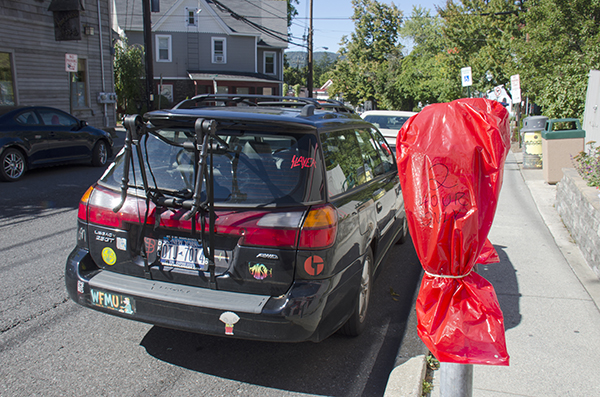

Red plastic bags cover the strip of parking meters along Main street, North Chestnut Street and North Front Street in New Paltz. The bags serve as a temporary fix, implemented in August by the Village of New Paltz in response to local outcry against a raise in meter prices, Deputy Mayor Rebecca Rotzler said.
Rotzler said the Village began the process of “bagging” the parking meters in “the core business district” after residents, patrons and business owners discovered meter prices in the vicinity had been raised from 25 cents an hour to $1 an hour and their use was limited to only one hour at a time.
Until the changes could be reversed, the price was set at the new 50 cents an hour fee and was configured to allow two hour parking in certain locations. The bags were the best option, Rotzler said.
Rotzler said the initiative to change the meters originally began before she joined the board in June with a committee of local business owners conducting research on the local parking situations.
“They did their own little study of the parking meter situation to make it better, but in the meantime what they had done was raise the rates,” Rotzler said.
However, Rotzler said the owners of “more retail-oriented businesses” were more involved with the committee which led to an oversight in terms of the “service-oriented” businesses.
“[Retail-oriented businesses] are more the type to do a quick shop, fifteen minute buy your pair of socks, necklac and leave.The restauraunts, yoga studios, pilates studios and such? Not so much,” Rotzler said. “It was basically sort of a not well-thought-out plan.”
David Santner, owner of The Bakery on Front Street, said he immediately heard complaints from his customers when the increase was implemented.
“At the time, [the meters] went off without anyone knowing what was happening,” Santner said. “When they first changed we had huge complaints from customers and a number said they wouldn’t come to the shop anymore because of the meters. They just couldn’t do it.”
Santner said he attended the meeting and found the officials “responsive” to his concerns.
“They were not aware of how it would affect many of the businesses in the area,” Santner said. “But they somehow thought we were all more aware of what was happening.”
Rotzler said that when the committee made the decision to implement their changes, they used an email system that was “not used as much as it used to” to spread the word.
“The committee felt they had studied it well enough and informed enough people,” Rotzler said. “But not everyone was checking for emails from this group.”
Those who hadn’t heard of the raise were “caught by surprise,” Rotzler said, and the Village began to receive numerous emails and phone calls.
An emergency meeting was called at Village Hall on Friday, Aug. 30, to address the concerns and complaints, Rotzler said. In the meantime she said she was able to get in touch with Department of Public Works to “work out solutions and be more proactive about the situation.”
That issue, Rotzler said, was with a device issued by the meter company. The device, which must be used manually to change each meter, was configured to change to one hour or four hour parking at the one dollar price.
Rotzler said the device had to be sent back to the company and that changes cannot be made until it’s returned. She said an estimate for the device’s return and the end of the bagging is roughly nine weeks from the starting point of the bagging process.
Until the meters are back in order, Rotzler said those monitoring the meters are “chalking tires” to keep track of vehicles in the metered spots. The attendants write a time in chalk on the vehicle’s tire and if the car is still there more than two hours later, they write the tickets.
